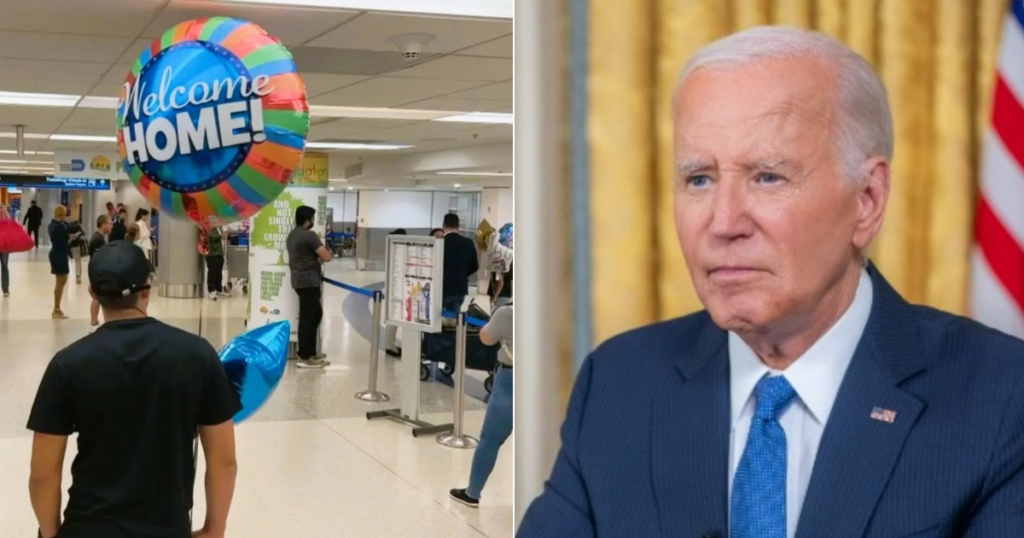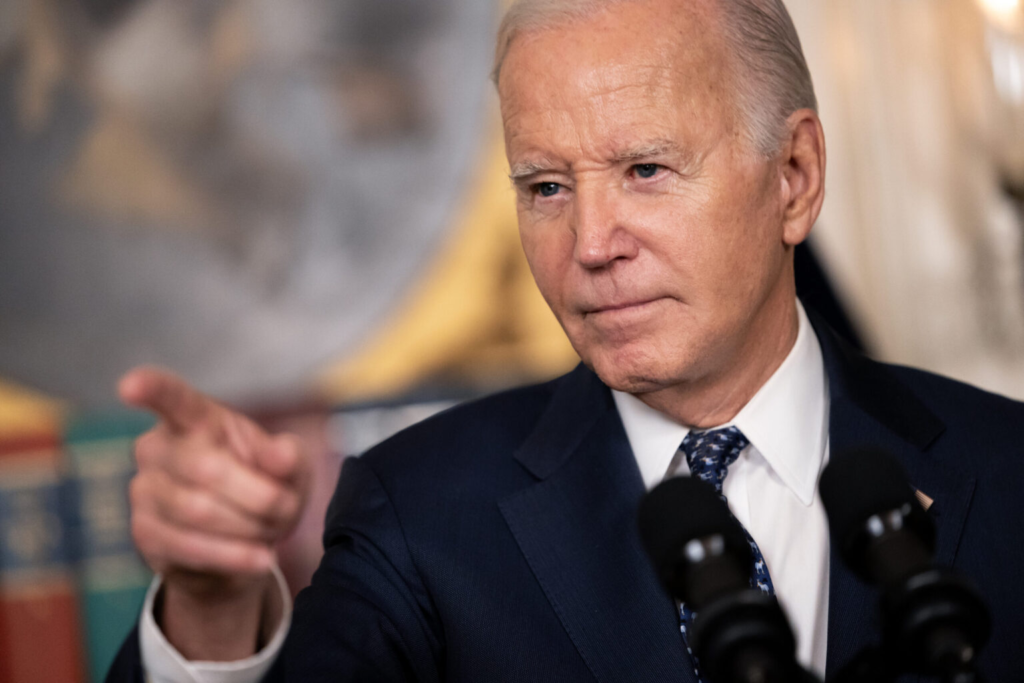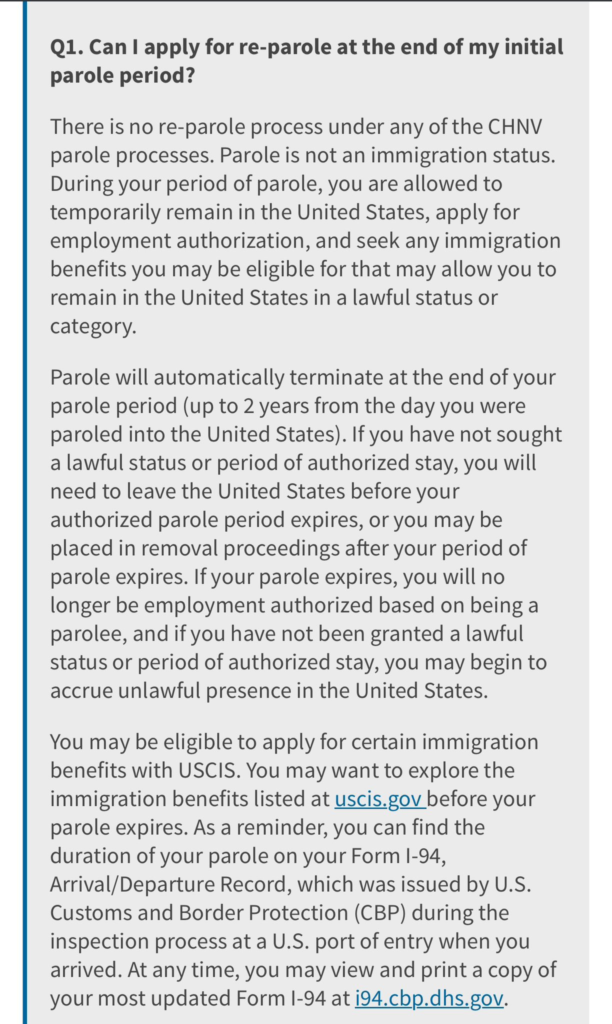US to Not Renew Legal Status for Migrants from Cuba, Venezuela, Haiti, Nicaragua. The Biden administration recently announced that it will not renew the parole program for immigrants from Cuba, Venezuela, Haiti, and Nicaragua, signaling a significant shift in U.S. immigration policy.
This program, which allowed migrants from these countries to live and work in the U.S. for two years, will now require those who have not found other legal ways to remain to leave the country once their permits expire.
While the program will continue to admit new applicants, the move has sparked political debates and raised concerns among immigrant advocacy groups.
Read : Israel a Vampire Regime, US is Rabid Dog: Iranian Supreme Leader Khamenei
The decision marks a crucial moment for the thousands of immigrants who have arrived in the U.S. under this program. The Department of Homeland Security (DHS) emphasized that migrants were given two years to work and apply for permanent status through legal avenues such as asylum. Those who fail to do so will face removal from the country or deportation proceedings.
The Parole Program: An Overview
The parole program, introduced halfway through President Biden’s term, was designed to reduce the number of illegal border crossings, which had reached record highs. Initially aimed at addressing migration from Venezuela in 2022, it was later expanded to include nationals from Cuba, Haiti, and Nicaragua.
Read : Russia Formally Declares the US as an “Enemy” State
The program enabled migrants to enter the U.S. legally through a sponsor, bypassing the perilous journey of crossing the southern border illegally. Applicants were allowed to travel on commercial flights and were granted two years of legal residency, during which they were expected to apply for other immigration benefits.

The program’s success in curbing illegal crossings has been evident, with a reported 99% reduction in unlawful entries from these four nations. This dramatic drop demonstrates the effectiveness of the parole system in offering an alternative route for migrants seeking entry into the U.S.
However, the announcement that the administration will not renew legal status for migrants after their two-year permits expire raises concerns for those who have yet to secure other legal protections.
Seeking Permanent Status: The Available Pathways
Migrants from Cuba, Venezuela, Haiti, and Nicaragua have had multiple options to seek legal permanent residency during their stay in the U.S. Many have already taken advantage of these pathways, such as applying for asylum, temporary protected status (TPS), or legal permanent residency through family connections.
For instance, under the Cuban Adjustment Act of 1966, Cubans are eligible to apply for permanent residency, which places them on a path to U.S. citizenship.
In addition to asylum applications, migrants from Venezuela and Haiti were granted temporary protected status (TPS), which allows them to stay and work in the U.S. for an extended period. Venezuelans can remain under TPS until September 2025, while Haitians are protected until February 2026.
TPS offers a reprieve from deportation for those who qualify, particularly in countries suffering from conflict, natural disasters, or other humanitarian crises.

Despite the expiration of the parole program, many immigrants from these nations have found legal avenues to remain in the U.S., reducing the number of people at risk of deportation. However, some individuals, particularly Nicaraguans, may still face challenges in securing permanent legal status.
According to U.S. Customs and Border Protection, over 530,000 migrants from these four countries have arrived in the U.S. under the parole program, with Venezuelans and Haitians making up the largest share.
Political Reactions and Immigration Challenges
The announcement that the U.S. will not renew legal status for migrants has sparked a political maelstrom, particularly among Republicans. The Biden administration’s approach to immigration has long been a contentious issue, with critics arguing that the president has used his executive powers more expansively than any of his predecessors.
Parole, a federal authority established in 1952, allows the executive branch to admit people on an emergency basis. Biden’s use of this authority to admit up to 30,000 new applicants each month has drawn criticism from Republicans who see it as an overreach.
On Friday, the House Republicans on the Homeland Security Committee slammed the decision, calling it a political maneuver to appear tough on immigration ahead of the upcoming presidential election, where immigration remains a key issue.

In a social media post, the committee accused the Biden administration of creating a “fraud-ridden” program and doubted that many migrants would be deported due to the numerous other legal pathways available for them to stay.
On the other hand, immigrant advocates have expressed concerns about the potential deportation of thousands of individuals, particularly Venezuelans. However, federal records suggest that most migrants have already found alternative legal protections, making widespread deportations less likely.
Angela Kelley, a senior adviser to the American Immigration Lawyers Association, emphasized that the parole program was always meant to be a temporary solution, serving as a “bridge” to more permanent legal status. Kelley urged migrants to apply for asylum and explore their legal options to stay in the U.S.
Navigating a Complex Immigration System
For those who have yet to secure legal permanent residency, the expiration of the parole program poses significant challenges. Migrants from Nicaragua may be at higher risk of deportation, although the authoritarian government in Nicaragua has been reluctant to cooperate with U.S. deportations.
In fiscal year 2023, fewer than 2,400 Nicaraguans were deported, indicating the difficulties in executing removals to the country. Even those who are placed in removal proceedings may remain in the U.S. for years due to the severe backlogs in immigration courts, which are overwhelmed with cases.
The Biden administration has reiterated that the program will continue to admit up to 30,000 new applicants each month, signaling its commitment to providing a legal avenue for migrants to enter the U.S.
However, the end of the parole program for current migrants underscores the administration’s efforts to balance humanitarian concerns with immigration enforcement. Asylum applications, humanitarian protection, and TPS remain critical options for those seeking to stay in the country.

Moving forward, it will be crucial for migrants to navigate the complex U.S. immigration system effectively, particularly as political debates over immigration intensify ahead of the presidential election.
The expiration of the parole program serves as a reminder of the temporary nature of such measures, and the importance of seeking more permanent legal solutions for those hoping to build a life in the United States.
The Biden administration’s decision not to renew legal status for migrants from Cuba, Venezuela, Haiti, and Nicaragua highlights the complex and ever-evolving nature of U.S. immigration policy.
While many immigrants have successfully found other ways to remain in the U.S. legally, those who have not yet applied for asylum or other protections face uncertainty as their parole periods expire. As political divisions deepen over the issue of immigration, the program’s future remains a critical point of debate.

